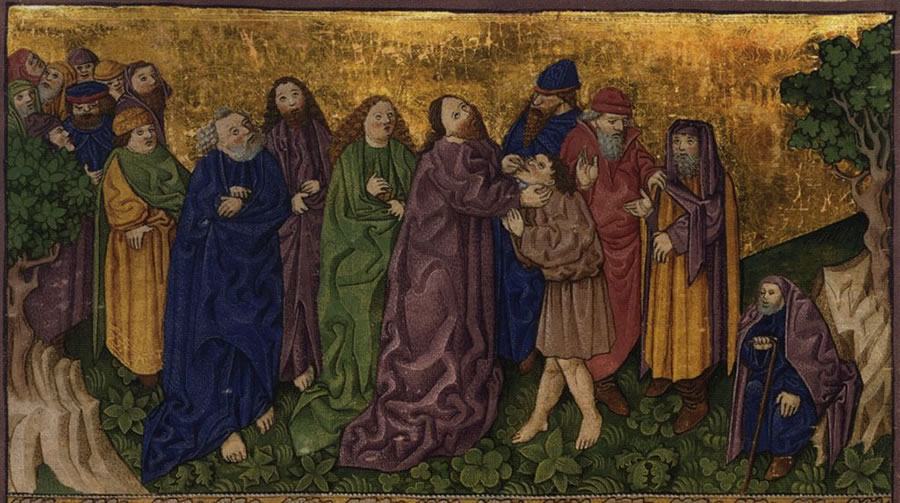St. Francis of Assisi Weekly Reflections
26th Sunday of Ordinary Time
09-30-2018Question of the WeekReading I: Numbers 11:25-29—Sharing the gift of prophecy
Reading II: James 5:1-6 - Saving the right focus
Gospel: Mark 9:38-43, 45, 47-48 - Sharing our possessions
Key Passage: Listen! The wages of the laborers who mowed your fields, which you kept back by fraud, cry out, and the cries of the harvesters have reached the ears of the Lord of hosts. (James 5:4)
Adults: What are the three most important values motivating your daily decisions?
Kids: Could a poor person who is wise be richer in a way than a foolish person who has many things? Why?

Whoever is not against us is for us
09-30-2018Weekly ReflectionWe Celebrate Worship Resource, Vol. 43, No. 3Half of what we hear today is comforting, but the other half is sobering. In the first reading the spirit of the Lord is bestowed upon the elders, enabling them to prophesy, to speak in the Lord’s name. Joshua objects, but Moses disagrees, going so far to say, “Would that all the people of the Lord were prophets!” (Numbers 11:29). The first half of the Gospel echoes this tolerance: “Whoever is not against us is for us” (Mark 9:40). Neither Jesus nor Moses wish to limit God’s power. On the other hand, in both the second reading and the second half of the Gospel, we hear the terrible consequences that will befall those who are “against God.” Those who value their riches over the welfare of others, Saint James writes, will rot and corrode just like their clothes, jewelry, and money will. This echoes what Jesus told his disciples: whatever causes you to sin would be better cut off before it ruins you. Though the grace of God is spread across the earth, available to all who accept it, those who throw up obstacles to this grace, who selfishly diminish the lives of others, will be judged harshly.
What part of yourself to do you need to cut off, do you need to remove?
READ MORE
Servant of All
09-23-2018Weekly ReflectionWe Celebrate Worship Resource, Vol. 43, No. 3Mark does not paint a pretty picture of the disciples. While Jesus is telling them that soon he would be put to death, they are busy arguing about who is the greatest. Surely they realize how terrible this was, as none of them will admit this to Jesus. Nevertheless, Jesus addresses their behavior, instructing them using the example of a child, one who is dependent on others for care. “Whoever receives one child such as this in the my name, receives me; and whoever receives me, receives not me but the One who sent me” (Mark 9:37). The lesson is clear; put aside your selfish ambition and care for the least of all. This is the kind of thinking that “the wicked” in the first reading utterly reject. Their selfishness inspires them to torture and kill “the just one,” foreshadowing the passion and death of the Lord. James addresses this jealousy and selfishness in his letter. When we are self-centered, we act as though we are the center of the universe, inevitably leading to conflict. When we exercise true wisdom, we acknowledge that we are just a speck in the universe. We make ourselves “the last of all and the servant of all” (Mark 9:35). It is in giving ourselves to the least among us that we receive more than we could ever possess on our own, that we receive God.
What can you do to put others before yourself?
READ MORE
Deny Yourself, Take up Your Cross and Follow Me
09-16-2018Weekly ReflectionWe Celebrate Worship Resource, Vol. 43, No. 3It is not easy to be Christian. That is, it is difficult to be a true Christian. Isaiah gives us a foretaste of this when he writes: “I give my back to those who beat me, my cheeks to those who plucked my beard” (Isaiah 50:6). Isaiah suffers as Christ would, and like Christ he suffers willingly. For God’s sake, he stands up to those who oppose him without fighting back. James does not speak of suffering, but he tells us that faith demands action. “Faith of itself, if it does not have works, is dead” (James 2:17). Dead. It is not enough just to believe. If our neighbor is in need and we do not respond, what good is our faith? The Gospel puts it all together. Jesus tells his disciples what it means to be a Christian. After telling them that he must suffer, die, and rise on the third day, he rebukes a protesting Peter: “Get behind me, Satan. You are thinking not as God does, but as human beings do” (Mark 8:33). Then he addresses his disciples and the assembled crowd, “Whoever wishes to come after me must deny himself, take up his cross, and follow me” (Mark 8:34).This, then, is what we need to do. This is what our faith demands.
How can you deny yourself in order to live as true Christian?
READ MOREMustum
09-16-2018Liturgy CornerFr. Paul Turner © 2004 Resource Publications, Inc.Mustum is a special grape juice that may be used for Mass under certain conditions. The juice is either fresh or preserved by methods that suspend its fermentation. Its nature has never been altered by freezing. Its contents have not been enhanced by preservatives or sweeteners. Mustum is not the same as grape juice commonly sold in grocery stores. Its production is carefully monitored and its distribution is comparatively small. It is obtained through some of the companies that produce altar wine.
READ MORE24th Sunday of Ordinary Time
09-16-2018Question of the WeekReading I: Isaiah 50:4-9a - Salvation through the Lord's servant
Reading II: James 2:14-18 - Faith and good works
Gospel: Mark 8:27-35 - First teaching of the Paschal event and the doctrine of the Cross
Key Passage: Faith by itself, if it has no works, is dead. But someone will say, "You have faith and I have works." Show me your faith apart from your works, and I by my works will show you my faith. (James 2:17–18)
Adults: Why should faith always lead to good works?
Kids: What good works can you do to show your faith in Jesus?
Altarcito
09-09-2018Liturgy CornerFr. Paul Turner © 2001 Resource Publications, Inc.An altarcito is a small altar that believers set up as a place for their personal prayer. This Hispanic custom is often observed in homes, but it may also be seen in schools, businesses or other locations. The actual altar might be a single shelf or a small table, usually set against a wall. Upon it are placed images of Jesus, Mary and the saints who have special significance to the household, such as Martin de Porres or a personal patron. Some families hand down such images from one generation to the next, so the articles represent the local family as well as the church's saints. Those who use this altar for prayer may also place a lighted candle there.
READ MORE23rd Sunday of Ordinary Time
09-09-2018Question of the WeekReading I: Isaiah 35:4-7a - Israel's deliverance
Reading II: James 2:1-5 - Against favoritism
Gospel: Mark 7:31-37 - Healing of a deaf-mute
Key Passage: Listen, my beloved brothers and sisters. Has not God chosen the poor in the world to be rich in faith and to be heirs of the kingdom that he has promised to those who love him? (James 2:5)
Adults: When has your faith in Jesus enabled you to speak out on an issue of importance?
Kids: What does your belief in Jesus mean to you?

The Healing of a Deaf Man
09-09-2018Weekly ReflectionWe Celebrate Worship Resource, Vol. 43, No. 3Our god is a transformative God. In the readings today we hear God transform our neighbor, our thinking, or our world in a radical way. Isaiah prophesies about the transformations the Lord will bring: the blind will see, the deaf will hear, the lame will walk, and the mute will sing. The land will be transformed as well, with life-giving water flowing in barren lands. Saint James describes how God transforms our thinking. Judging others based on appearance or wealth is wrong, and in fact unchristian, as Christ repeatedly favored those who were poor in the eyes of the world. We encounter one of those people in the Gospel. Mark does not even note his name, but he is deaf and has a speech impediment. He is not even able to address Jesus. Nevertheless, asked by the crowd, Jesus heals the man. Mark gives us an idea of how much effort Jesus put into it, describing the process in detail and specifying that Jesus “groaned” when looking up to heaven. The crowd, though instructed to keep silent, cannot help but proclaim, “He makes the deaf hear and the mute speak,” invoking the words of Isaiah (Mark 7:37). Jesus has transformed the life of the deaf man as well as the lives of all who witnessed healing.
How has God transformed you life?
READ MORE
Be Doers of the Word
09-02-2018Weekly ReflectionWe Celebrate Worship Resource, Vol. 43, No. 3Actions speak louder than words. From Moses to Saint James to Jesus in Saint Mark's Gospel, it's unanimous: it's not what you say that God values, but what you do. God in fact provided the model for us, as James points out. First, however, we hear the words of Moses, telling the people that observing God's commandments will show others how great God is. They will be impressed by seeing what you do. In the second reading James reminds us that God's word is a word of action. God created the world and everything in it by pronouncing the word. In the Gospel it is Jesus, the Word made flesh, who points out the difference between those who honor God's commandments and those who don't. The scribes and Pharisees, raising their eyebrows when the disciples fail to purify their hands, are called out as hypocrites. It is what is in the heart, what comes from within, that matters. It goes back to what James wrote, which basically sums up his entire letter: "Be doers of the word and not hearers only, deluding yourselves" (James 1:22).
Are you failing to act on what you believe? How are you deluding yourself?
READ MORE22nd Sunday of Ordinary Time
09-02-2018Question of the Week Reading I: Deuteronomy 4:1-2, 6-8 - Advantages of fidelity
Reading II: James 1:17-18, 21b-22, 27 - Response to God's gift
Gospel: Mark 7:1-8, 14-15, 21-23 - Jesus and the Pharisees
Key Passage: Welcome with meekness the implanted word that has the power to save your souls. But be doers of the word, and not merely hearers who deceive themselves. (James 1:21–22)
Adults: Which words of Jesus provide the most inspiration for the Christian work that you do?
Kids: How do you welcome the words of Jesus into your heart?